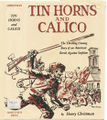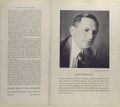Difference between revisions of "Tin Horns and Calico"
JElberfeld (talk | contribs) m |
JElberfeld (talk | contribs) m |
||
| Line 10: | Line 10: | ||
But broken it was, though it took many years of suffering and terror to bring domocracy to the Empire State. If is significant that, thought the farmers had to resort to force to protect themselves, they never took the offensive in solving their problems by violence. In the end their victory was won by the vote. The Anti-Rent Rebellion led directly to the passage of the federal Homestead Act of 1862 which opened athe West to the people. Indirectly it led to the birth of the Republican Party: one of the principal Anti-Rent agitators named the party and call the first meeting. | But broken it was, though it took many years of suffering and terror to bring domocracy to the Empire State. If is significant that, thought the farmers had to resort to force to protect themselves, they never took the offensive in solving their problems by violence. In the end their victory was won by the vote. The Anti-Rent Rebellion led directly to the passage of the federal Homestead Act of 1862 which opened athe West to the people. Indirectly it led to the birth of the Republican Party: one of the principal Anti-Rent agitators named the party and call the first meeting. | ||
| − | Henry Christman, born and reared in New York State on land | + | Henry Christman, born and reared in New York State on land which was once leasehold, became interested in the Anti-Renters' story some years ago. Finding almost no material in histories of the period, he started collecting old newspapers and official documents, unearthing letters and diaries in the homes of Anti-Renters' descendants. Most of what he tells in this book - and a moving, colorful story it is - has never been told before. It is a genuine fresh contribution and one of those books which are always needed, for we cannot be reminded too often that democracy demands periods of vigilance and upheaval, and constant awareness of the people's all-powerful weapons - the ballot box and legislative action. |
HENRY CHRISTMAN was born in 1906 on a farm in upper New York State. He went to Alfred University, then joined the staff of the ''Albany Evening News'' and the ''Albany Knickerbocker Press''. For two years he was managing editor of the ''New York State Journal''. His research for TIN HORNS AND CALICO was occupied him for over fifteen years. He is now with the Office of War Information on foreign service. | HENRY CHRISTMAN was born in 1906 on a farm in upper New York State. He went to Alfred University, then joined the staff of the ''Albany Evening News'' and the ''Albany Knickerbocker Press''. For two years he was managing editor of the ''New York State Journal''. His research for TIN HORNS AND CALICO was occupied him for over fifteen years. He is now with the Office of War Information on foreign service. | ||
Latest revision as of 23:42, 3 March 2013
A history of the Anti-rent Wars in the Hilltowns and surrounding area.
Few people know the true story which this book tells so brilliantly. Though historians have set down some salient facts about the "Tin Horn Rebellion' in New York State in the 1840's, Henry Christman is the first to write fully the honest, factual day-to-day account in terms of the human beings who took part in the struggle, the one of the most decisive triumphs of democratic action in our history.
Only 100 years ago in New York State a few families intricately intermarried, controlled the destinies of 300,000 people and ruled in almost kingly splendor over nearly 2,000,000 acres. Albany was the social and political capital of this island of semi-feudalism in a nation which had, only a half century before, declared its common faith in democracy and free enterprise. Here the farmers of a adozen counties were bound permanently to their landlords by a lease formulated by Alexander Hamilton, who had married into the landed aristocracy. Rebellion, long dormant, flared up among the hard-pressed tenants of Rensselaerwyck when the heirs of the Stephen Van Rensselaer III tried to collect back rents which their father had allow to go unpaid for many years-and for a good reason. The "Good Patroon" had dreaded the crystallization of slumbering opposition to a reign which had netted him 41 million dollars.
The farmers' revolt gained momentum, spread among the people bound by other big landowners in the Hudson Valley. Like the patriots at the Boston Tea Party, these tenants,many of the descendants of Revolutionary soldiers, disguised themselves as "Indians" in warpaint and calico, whenever it was necessary to resist evictions. An they used their tin dinner horns to signal from farm to farm to rally the neighborhood against the sheriff and his offending writs. The struggle became almost immediately an issue in state politics, where young William H. Seward had set his policy directly against the Hamiltonian idea of a privileged class. Linked to the growing slave issue and the nation's policy of disposing of public lands, it became an important factor in the national political unrest between 1840 and 1860. It attracted the support of non-farmers, of liberal thinkers as far away as England. Dr. Smith Boughton, known as "Big THunder," is only one of the Anti-Renters whose career is a dramatic thres in the book: without the heroic efforts of Dr. Boughton and the hundreds like him, the tyranny of serfdom in the New World might not have been broken.
But broken it was, though it took many years of suffering and terror to bring domocracy to the Empire State. If is significant that, thought the farmers had to resort to force to protect themselves, they never took the offensive in solving their problems by violence. In the end their victory was won by the vote. The Anti-Rent Rebellion led directly to the passage of the federal Homestead Act of 1862 which opened athe West to the people. Indirectly it led to the birth of the Republican Party: one of the principal Anti-Rent agitators named the party and call the first meeting.
Henry Christman, born and reared in New York State on land which was once leasehold, became interested in the Anti-Renters' story some years ago. Finding almost no material in histories of the period, he started collecting old newspapers and official documents, unearthing letters and diaries in the homes of Anti-Renters' descendants. Most of what he tells in this book - and a moving, colorful story it is - has never been told before. It is a genuine fresh contribution and one of those books which are always needed, for we cannot be reminded too often that democracy demands periods of vigilance and upheaval, and constant awareness of the people's all-powerful weapons - the ballot box and legislative action.
HENRY CHRISTMAN was born in 1906 on a farm in upper New York State. He went to Alfred University, then joined the staff of the Albany Evening News and the Albany Knickerbocker Press. For two years he was managing editor of the New York State Journal. His research for TIN HORNS AND CALICO was occupied him for over fifteen years. He is now with the Office of War Information on foreign service.
Author: Henry Christman
Paperback
Publisher: Hope Farm Pr (June 1978)
Language: English
ISBN-10: 0685611302
ISBN-13: 978-0685611302
A dramatically narrated account of the mid-ninteenth revolt of farmers on the Hudson River against the vestiges of the feudal land system that lingered on in their section of the New York State.
Berne, as the center and meeting place for the Anti-Rent participants, was the Capitol of the movement and forever a part of the progress of democracy.
As a contribution to this Country's Bi-Centennial observance, the Berne Historical Society sponsored the re-publication of the book originally published in 1945 by Henry Holt and Company.
Available from Amazon.com





